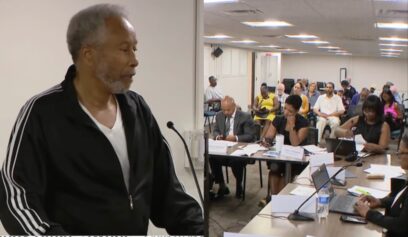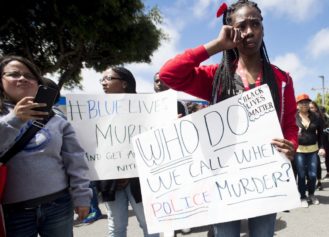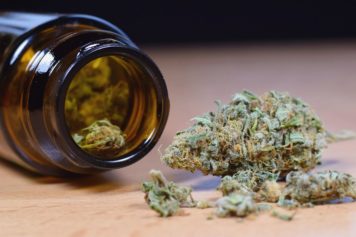[playwirevid id=’3667891′]
It’s been 150 years since enslaved Africans were freed in the South in the two years following the Emancipation Proclamation. There is a sitting Black president in his second term, but many Black people do not feel a sense of freedom or safety in America.
Killedbypolice.net, a website that collects news and reports that appear on the Internet about deaths during interactions with the police, estimates that nearly 500 Americans have died in officer-involved incidents since Jan. 1. Many of these deaths have been African-American men and women. This comes exactly 152 years since the signing of the Emancipation Proclamation.
Joseph Hudson, founder of the Hudson Strategic Group in Riverdale, Georgia, argued that parallels that exist between the Civil War and police brutality come down to economics. “Look who controls the money to pay for the function of the police. We don’t,” the 73-year-old said. “Even the Civil War was about money. The South didn’t want to give up having free labor. The war was never really about freeing slaves.”
A healthy 18-year-old slave would be purchased in 1845 for $650, which would equate to $14,500 in today’s economy. If this were broken down to an hourly wage, it would be $6.97, which is just under the federal minimum. Within five years, that same slave would be sold for a $350 profit equating to $21,500 in today’s economy, which breaks down to $10.33 per hour, a wage earned in the average call center.
According to Payscale.com, the average salary in the United States for a police officer is $47,996, which will vary with the availability of leadership training within a municipality. In the wake of the deaths of Michael Brown, Tamir Rice and Eric Garner, more police departments have been asked by the White House to have their officers wear body cameras to record any potentially hostile interaction with citizens. However, as reported by WPXI News of Pittsburgh, body cameras can cost $199 per officer for a department that needs them for 100 officers, plus $55 per month in data storage. This equates to $86,000 in first-year startup costs for an already cash-strapped police department.
Only one-third of all police departments in the nation are using police body cameras, so it has been the citizens who have taken it upon themselves to record and stream negative interactions with law enforcement entities. Unfortunately, except for in the case of Freddie Gray of Baltimore, the officers are rarely brought in for indictment or conviction because they are often shielded by a “blue wall,” a code of secrecy that police officers have often used to protect their brothers in blue. It wasn’t until peaceful protests turned into riots in Baltimore that officers involved in Gray’s death, which resulted from a severed spine while he was in police custody, were charged and the matter was taken up by the city’s Attorney Marilyn Mosby last month.
If African-Americans have been emancipated for nearly one and a half centuries but continue to fear being brutalized by the police, then, is there any change possible that could unite both citizens and those charged to protect them? Menelik Pope, who is pursuing his master’s degree in African-American Studies at Georgia State University, believes that the Constitution does not fully engage the role of law enforcement for modern times.
“It is the oldest Constitution on the planet, and it is absolutely out of date and behind the times,” he said. “It was conceived by slave-owning people who did not have the perspective of the world today.”
In Pope’s opinion, if the Constitution is overhauled and modernized to represent the current and future voting population, there may be a way to provide for better community parity between law enforcement and the citizens they have been sworn to protect.
It has been estimated in a May 25, 2014, article appearing in Forbes magazine that African-Americans are owed $1.75 trillion in reparations, which is nearly the amount of the Black community spending or buying power. According to studies conducted by the Atlanta Black Chamber of Commerce, the average Black entrepreneur makes $65,000 and the average Black household takes in $33,000 annually. Would receiving reparations be the key to improving the quality of life for African-Americans, or is it just wishful thinking?
Dr. Daniel P. Black, the author of They Tell Me of a Home and Perfect Peace, applauds the efforts of historically Black colleges and universities to educate children of African descent, but it may be time to revisit the curriculums for something more African-centered.
“I think that some of the biggest achievements since enslavement have been the ways that Black colleges and independent Black schools have educated those that the system would usually disregard,” he said. “We’re now doctors and lawyers on the same land where we once toiled as slaves. However, what we need now are new institutions.”
Since 1865, about 106 historically Black colleges and universities were established by the Freedmen’s Bureau to provide thousands of freed Black people with a formal education. Today, the Internet and virtual learning spaces have increased the availability of post-secondary resources, but financial instability and waning alumni giving hurt schools like Morris Brown College and presently endanger the future of South Carolina State University and other Black institutions.
Spelman College, a member of the Atlanta University Center, is the strongest historically Black college with a graduation rate of 86 percent, according to March 30 article in the education section of The Business Insider.
The achievements of Spelman and other benchmarks of success within the African-American community will be the highlight of a Juneteenth documentary that began shooting on June 8. A festival was planned at Mozley Park in southwest Atlanta from June 10-13 to commemorate 150 years of emancipation.



